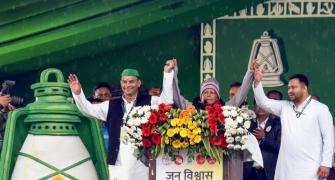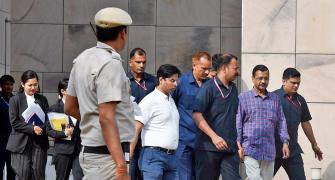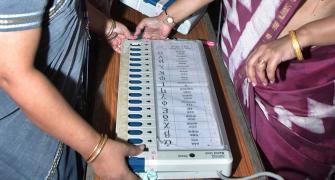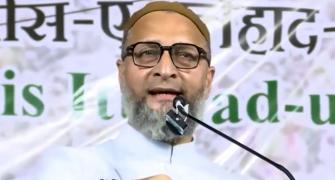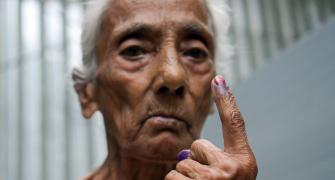Jaswant Singh, currently Leader of the Opposition in the Rajya Sabha and the Indian representative in the strategic dialogue with the United States that followed India's 1998 nuclear tests, does not attach much importance to New Delhi's strategic partnership with Washington and the Next Steps in Strategic Partnership.
The erstwhile external affairs minister in the Vajpayee government -- in a rambling presentation at the Washington think-tank, the Brookings Institution -- declared, "The foundation of strategic partnership or of natural allies (a term coined by then prime minister Atal Bihari Vajpayee to describe the Indo-US relationship) can only be candour. It cannot be subterfuge."
Speaking to a overflowing, standing room audience of senior Bush administration officials, policy wonks, heads of think tanks -- incidentally, his US counterpart in the strategic dialogue, former deputy secretary of state in the Clinton administration Strobe Talbott is president of the Brookings Institution -- and an assortment of scholars and diplomats, Singh made out a laundry list of perceptions that both Washington and New Delhi has of each other which, he felt, hardly lent itself to a strategic partnership of any substance.
Jaswant Singh's comments in New York
"As far as the US is concerned, it considers that India continues to live in the shadow of the Cold War. That some of the historical precepts of that period have not really left Indian policymaking -- that India is really a kind of a hidden Cold (War)warrior."
In turn, Singh added, "India feels the United States of America, judges India far too much against the backdrop of the historical overhangings of the Cold War."
He argued that Washington believes Indians and Indian governments "moralise too much and everytime there is a need to do something, instead of doing something, India begins to moralise on great issues -- a lot of vapour, every little substance."
He concluded his perception-misperception index with the US convinced that India "has not stood by the US in the past 50 years on global issues" while India believes Washington "has had an adversorial attitude to India even though India was a democracy it preferred military dictators."
That Washington "doesn't accord to India what is due to India and also that at times, the commitment of the United States of America to democracy is really a matter of convenience," he said.
"The problem is that there is an insufficient harmony between promise and delivery in both countries," he said.
Singh went on the cite "the theory of unintended consequences and it is best exemplified by the promotion by the United States of America of the Taliban and the consequences the Taliban brought in its wake."
"I don't want to cite the present problem areas like Iraq, Iran, they are very much there," Singh said, and discussing the "inability to harmonise two equally matching requirements of State policy," cited Washington's beefing up of Pakistan militarily.
"It is entirely your right and it is entirely the right of Pakistan to so commit itself to that," he acknowledged. "But there are unintended consequences of that."
Singh warned this "entire region today could well become an arena where this theory of unintended consequences has a play which will be destructive -- has earlier been damaging, now it could be very damaging."
"And unfortunately," he added, "what happens in this region is of vital consequence to India because the bills of all the occurences have an uncanny ability to arrive on India's table."
In the interaction that followed his more than 40-minute presentation billed as 'India-US Strategic Partnership: Perceptions, Potential, and Problems,' Singh said he did not believe India has had "any satisfactory strategic partnership."
He said the often cited alliance with the former Soviet Union was not a strategic partnership in his opinion, but "a great power using the partner and understandably for the great power's benefit."
Singh noted this is not a partnership and said "you don't have to define strategic partnership when you talk about Great Britain and the United States," because as someone had concluded it's "the cozy club of Anglo-Saxon cousins -- they are natural partners."
"I believe that India and the United States must be strategic partners," he said, "but the two countries must understand what is it that is meant by strategic partner or natural ally. This concept should not be a concept, which instead of bringing us together, divides us."

